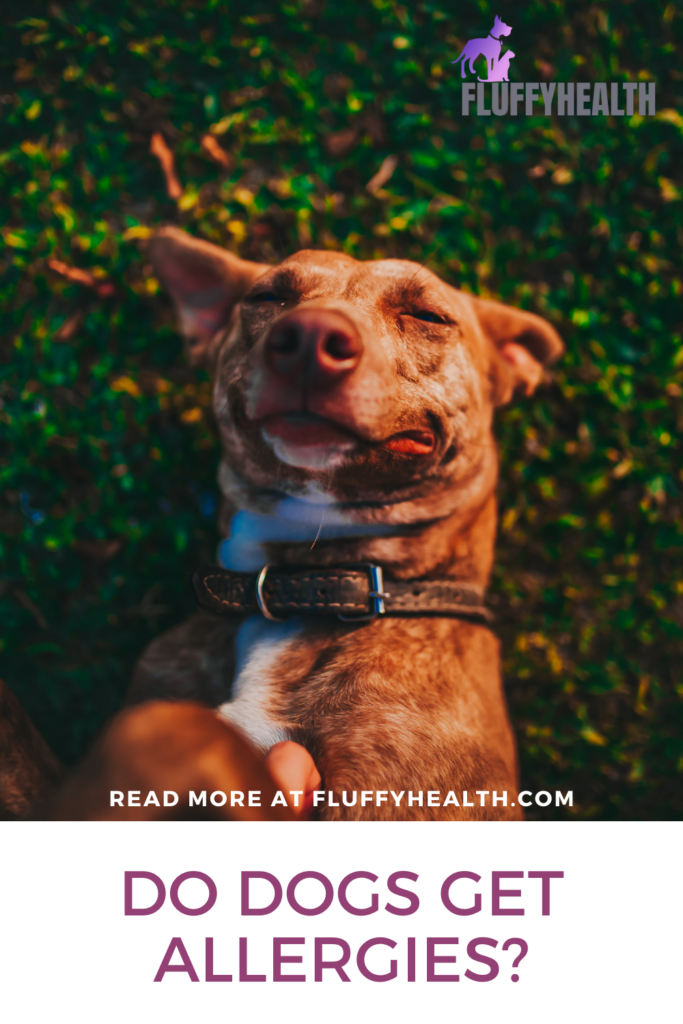Do Dogs Get Allergies? That’s an important question since allergies are a common problem for humans. Most dog owners are skeptical about whether dogs get allergies or not.
The reason for this is that they often find the desire in themselves to share food with their puppies, and they are afraid of the consequences given that pets and humans digestive systems aren’t alike. But do dogs get allergies? How do dogs get allergies? And should food be your only concern? Keep reading to answer these questions.
Table of Contents
Do Dogs Get Allergies? The Answer!
Yes, indeed, your puppy can have allergy just like you do, and in almost all forms that human allergies came in. According to Wikipedia, “Dogs are susceptible to allergies much like their human companions.” Allergies in dogs aren’t simple, and in most cases, they might lead to serious health problems if not spotted and been dealt with as quickly as possible.
It’s required that all pet parents be an eye-cleared over their puppies; veterinarian consultant should be mandatory at the time. But when things are at its early stages, the best thing that could help you is to be well-informed and well-enlightened about allergies in dogs, their types, symptoms, and the way they can be handled to ensure the pup is safe.
How Do Dogs Get Allergies?
Typically, your dog inherited its potential to be allergic to its parents. After extended exposure to the allergens for months or years, the allergy signs become apparent in the dog. The usual allergic dog begins with a brief period of biting, scratching, and chewing, which may be mild or unnoticeable.
With repeated exposure to the allergens, your dog gradually experiences prolonged periods of itching and changes in the skin’s color and texture. In most dogs, allergy’s initial signs develop during the first 2-4 years of life.

What Are The Types Of Allergies In Dogs?
Allergies usually happen due to an entrance of a foreign substance (allergens) in the body that triggers the immune system and releases a series of misguided reactions.
As a dog owner, you aren’t obligated to keep an eye on your dog if your puppy has that allergy. But, there are dozens of allergy types you should be cautious about.
Your pup could be allergic to chicken, lamb, egg, beef, soy, fish, flea, etc.
All types of dog allergies can be classified into three subcategories food allergies, skin allergies, and environmental allergies.
The Most Common Type Of Allergy In Dogs
Skin allergies (or allergic dermatitis) are the most common type of allergies in dogs. Usually, this occurs when the pet inhales or digests a sensitive substance, and it’s mainly in the form of a pruritic or itchy disease.
There are three reasons why your dog is scratching its skin, and your pet might be exposed to flea allergy dermatitis, some kind of environmental allergy, or food allergy.
An allergy mainly causes itchy skin in your puppy to flea bites or even flea saliva at times. Skin allergy resulting from flea bites could make your pup’s tail red and inflamed. It can be spotted by noticing flea dirt in your dog’s skin or seeing the fleas themselves flying around your puppy.
If your dog is suddenly scratching its paw or ear, this mainly due to an allergic reaction towards a specific type of food. It also could be allergy from particular fruit, meat, or vegetable that triggered this sever itch.
Dogs’ sensitivity from mold, pollen, or dust could cause what is known by atopic allergic reactions. Some changes in weather could lead to skin itch in dogs as well. Here the itch could stop once the environmental changes have gone away.
The most alarming issue with skin allergy in dogs isn’t its widespread among different species nor its several cases been reported annually but rather the secondary infection that could come from severe scratching and biting from your dog’s side.

The Most Neglected Type Of Allergy In Dogs
We call food allergies in dogs neglected mainly because pet owners aren’t eye-vigilant towards what food is around their dogs. For example, whether it suits them or not, a dog parent who isn’t aware of whether dogs get allergies or not won’t look twice before they share human food with the puppy. The pet owner’s side’s ignorance makes food allergies more dangerous than the common easy-to-spot skin allergies.
Nevertheless, before starting a treatment plan, you should be fully aware that your dog’s allergy is a true food allergy. What we mean here is that sometimes dogs might develop sensitivity or intolerance towards certain foods. Unless these foods trigger immune reactions here, the allergy is mainly considered a skin allergy, not a food allergy.
Beef, dairy, chicken, eggs, meat, lamb, and soy are the most common foods that dogs might be allergic to.
The Most Alarming Type Of Allergies In Dogs
A severe reaction to a specific allergen could lead to anaphylactic shock in dogs; if not treated, it is fatal. Vaccines, drugs, and bee stings are the leading three causes of anaphylactic reaction in dogs and are the primary allergens a pet owner should keep an eye on.

Symptoms Of Allergies In Dogs?
It can be challenging for you as a dog owner to notice all the symptoms and that because the symptoms of allergies in dogs may vary depending on the type and cause. If a dog goes into anaphylactic shock, its blood sugar will drop, followed by the shock, which is quite different from a skin allergy condition.
However, the following symptoms are the main signs of an allergic reaction.
- Itchiness
- Redness & Inflamed Skin
- Vomiting
- Diarrhea
- Hives
- Itchy Ears
- Swelling Of The Face, lips, Eyelids, Earflaps, Or Ears
- Chronic Ear Infections
- Constant Licking
- Sneezing
- Itchy, Runny Eyes
Diagnosis Of Allergies In Dogs
The problem often most veterinarians suffer from is widespread of allergy symptoms in other types of diseases. Thus, the first step in an allergy test is to rule out similar conditions leading to the same symptoms.
Once the vet has been sure that this is indeed an allergy, the next step would be to determine which type of allergy is it and what is the allergen responsible.
Food allergies are easy to spot. All the veterinarians have to do is give you a dietary schedule for your dog to follow, then eliminate foods one by one to reach the allergen. Skin allergies are also easily detected due to their apparent marks in your pup’s body (especially around the ear and face).

Treatment Of Allergies In Dogs
You can’t treat an allergy if you don’t know whether dogs get allergies or not in the first place. That’s why we think having explicit knowledge about your pup’s biology might be the best way to protect it.
The best way to treat an allergy in dogs is prevention, which means your dog must avoid the cause and allergen. Unfortunately, this may not always be achievable. Nevertheless, in terms of allergy treatment, it depends on your dog’s type of allergy. For example, the most reliable way to attend flea allergy dermatitis is to eliminate the fleas. In contrast, the safest way to treat a food intolerance or food allergy is by changing your dog’s diet.
Additionally, to any lifestyle alterations that might be needed, your veterinarian will also guide you to help manage your dog’s signs connected with the allergic reaction, such as itching and any secondary skin infections that may have emerged as a consequence of the irritant.
Hence, if your dog is suffering a severe allergic reaction, you must get your dog to the nearest emergency veterinary hospital as soon as possible.

Few Words About The Question, Do Dogs Get Allergies?
As we reached the end of this article, it is obvious now that the answer to the question, do dogs get allergies? Yes, is the answer.
We also concluded that there are different types of allergies and that the prevention and managing the dog’s allergy signs as quickly as possible is the best course of treatment. In the next posts, we will go through more details about the different types of allergies in dogs and all the remedies of allergies in dogs to help me overcome this health issue.
If you have more information or a different answer to the question, do dogs get allergies, please write them down below in the comment section. So, every dog owner benefits from that.
You’ll Also Love These Posts:
Studies have shown if you like this blog article — you will also love the following posts.




